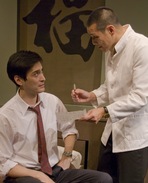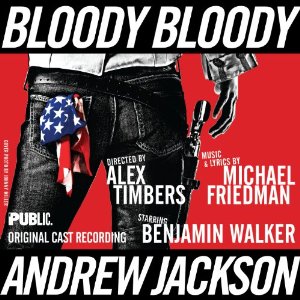SITE GUIDE
SEARCH
REVIEWS
REVIEW ARCHIVES
ADVERTISING AT CURTAINUP
FEATURES
NEWS
Etcetera and
Short Term Listings
LISTINGS
Broadway
Off-Broadway
NYC Restaurants
BOOKS and CDs
OTHER PLACES
Berkshires
London
California
New Jersey
DC
Connecticut
Philadelphia
Elsewhere
QUOTES
TKTS
PLAYWRIGHTS' ALBUMS
LETTERS TO EDITOR
FILM
LINKS
MISCELLANEOUS
Free Updates
Masthead
A CurtainUp Review
The Nanjing Race
Lina Zeldovich
|
I crawl in the desert for so long, all of a sudden a god flies down. He offers me water. I am afraid he will be offended if I dare to accept. -- Bao
|

Pictured (left-right): Marcus Ho as Philip and Ian Wen as Yu Ahn
(Photo: Kim T. Sharp) |
Also known as Nanking, the province is infamous for the Nanjing Massacre that occurred on December 13, 1937 during the Second Sino-Japanese War, when hundreds of thousands of Chinese civilians were murdered and thousands of women were raped. While set in the late eighties, The Nanjing Race explores this historical heritage, the agonizing reminiscence, and the unsolvable prejudices of those who lived through it all.
A forty-something, gay, half-American, half-Japanese, Phillip Hagen (Marcus Ho) finds himself on a business trip in Nanjing, where he is to attend an industrial fair and negotiate the best prices for purchasing metals for his company. Hagen's superiors are under the impression that he would get a better deal than an Anglo-American emissary because of what they perceive as "his Asian connection," or more blatantly, his subtle but apparent Asian looks. Hagen, however, considers himself an American to the point of dismissing his Japanese half. Having been through a few unpleasant ethnic bumps during his childhood he refused to ever speak Japanese to his mother. He doesn't appear to be overly thrilled with the trip either:. His irritation begins with the the flight being delayed. Then he finds , the bed to be uncomfortable. The chief annoyance is caused by the officious hotel floor-boy Yu Ahn's (Ian Wen) obsequious eagerness to help which ranges from polishing shoes to unpacking Hagen's suitcase to offering Chinese remedies for super-potency.
Yu Ahn's mercenary intentions expand much further than the desire for good tips. He hates China with a passion, and is hell-bent on immigrating to America. That aim depends on his obtaining a sponsor. out Hagen is not his first desperate attempt to succeed at finding someone to make his Western escape possible and not a likely candidate since it's the other floor-boy, Bao (James Chen), who catches Hagen's eye.
Unlike Yu Ahn, Bao comes across as polite, reserved, curt and delicate in a peculiar way. A man of a few words, he engenders curiosity in Hagen who, as it turns out, e is a homosexual also. The two men strike up a sudden and unexpected relationship that they both enjoy. Bao's way of speaking and seeing the world is poetic and perhaps a bit old fashioned as his life viewpoints are deeply rooted in Nanjing history. A patriot who's proud of his heritage, Bao honors and cherishes the stories told to him by his mother as "Impossible to forget" Both Yu Ahn and Bao are in their late thirties and are friends, though that friendship has on occasion been tumultuous, a situation exacerbated when Hagen considers sbringing Bao to the USA. This complicated triangle quickly becomes a Gordian knot, which, no matter how cut, will result in pain. Everyone in this play has a grievous story to share: Yu Ahn has a son he is not allowed to see; Bao has lost his partner during their audacious attempt to swim to Hong Kong; and Phillip, who had been y scarred the least in comparison, had suffered his share of prejudices ("I walk into a doorman building with a Chinese take-out, they tell me deliveries are in the rear.") It is his Japanese half that will make the pivoting change in his budding relationship, but we can only guess for better or for worse.
Director Brian Tom O'Connor uses the tiny space most impressively to stage a play which takes us on a journey thousand miles away. Every door, every passageway and every back room of the theater is creatively used to evoke compelling scenery. During the second act, the play takes us outside, to the old city gates, where Bao brings Hagen to see all of Nanjing sprawled along the Yangtze River. The set and the acting work well to give the audience the full impression of the two lovers sitting on the edge of a cliff overlooking the province below.
The story is compelling and educational even though the first act feels a little stretched and Yu Ahn's servile offers go on too long. The play explores complex and controversial concepts, and while James Chen's and Ian Wen's performances are powerful and believable, Marcus Ho's does not grab us with the same level of intensity. Although he is the the main character it is not Hagen's misfortunes that we remember at the end. Somehow Bao's and Yu Ahn's stories, as well as their delivery dominate, especially as the play approaches its culmination. It is the pain and grief of those who had suffered the massacre that we dwell on long after the play is over, as . the two floor boys who are left to to fight their own demons.
|
The Nanjing Race Written by Reggie Cheong-Leen Directed by Brian Tom O'Connor Cast: Marcus Ho (Phillip Hagen), Ian Wen (Yu Ahn), James Chen (Bao) Sets and Lighting: Andrew Lu Costumes: Jenny Mannis Sound: David Margolin Lawson Stage Manager: Genevieve Ortiz Abingdon Theatre Company 312 West 36th Street. 212.868.2055 From 10/29/10; opening 11/07/10/closing 11/29/10. Wednesdays and Thursdays a@7pm; Fridays and Saturdays @ 8pm; Saturdays and Sundays at 2pm @ 8pm. Reviewed by Lina Zeldovich based on Nov 4 press performance. |
|
REVIEW FEEDBACK Highlight one of the responses below and click "copy" or"CTRL+C"
Paste the highlighted text into the subject line (CTRL+ V): Feel free to add detailed comments in the body of the email. . .also the names and emails of any friends to whom you'd like us to forward a copy of this review. Visit Curtainup's Blog Annex For a feed to reviews and features as they are posted add http://curtainupnewlinks.blogspot.com to your reader Curtainup at Facebook . . . Curtainup at Twitter Subscribe to our FREE email updates: E-mail: esommer@curtainup.comesommer@curtainup.com put SUBSCRIBE CURTAINUP EMAIL UPDATE in the subject line and your full name and email address in the body of the message. If you can spare a minute, tell us how you came to CurtainUp and from what part of the country. |

Slings & Arrows-the complete set
You don't have to be a Shakespeare aficionado to love all 21 episodes of this hilarious and moving Canadian TV series about a fictional Shakespeare Company






